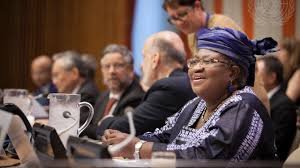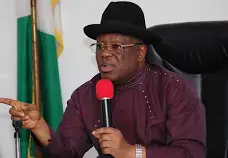Up until penultimate Friday, there is No challenger to the incumbent World Trade Organization Director-General Ngozi Okonjo-Iweala. Barring any sudden opposition, she will not face any challengers in her push for a second term, with no other candidates nominated during a window that closed on Friday at midnight in Geneva.
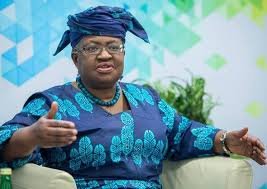
In this report, Gom Mirian explores the challenges Okonjo-Iweala might face in securing another term and the broader implications of a potential Trump presidency on the WTO’s future.
The leadership of the World Trade Organisation (WTO) plays a crucial role in shaping global trade policies, resolving disputes, and advancing reforms that could make the trading system more inclusive and equitable. Ngozi Okonjo-Iweala, a key player in global trade is the first African and female Director-General of the WTO, took office in March 2021 during a particularly turbulent time for global trade. Her tenure has been marked by challenges such as the COVID-19 pandemic and escalating geopolitical tensions, yet her vision for reform has earned her significant praise. As her term approaches its conclusion in 2025, Okonjo-Iweala now faces the possibility of securing a second term. However, her reappointment is likely to be influenced by the shifting political landscape in the United States, particularly with the return of Donald Trump to the White House.
Okonjo-Iweala’s reappointment bid comes at a critical juncture, with significant implications for the future of global trade governance. Recent developments have highlighted the political complexity surrounding the process, including the announcement by the WTO’s General Council that a special meeting will be held in November 2024 to advance the selection process for the next Director-General.
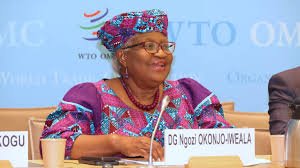
In an unprecedented turn, the only candidate nominated for the role, as of the nomination deadline on November 8, 2024, is Okonjo-Iweala herself. This sets the stage for a decision-making process that will likely be shaped by both her leadership performance and the broader geopolitical landscape, including the role of the United States under a potential second term of Donald Trump’s presidency.
Okonjo-Iweala’s Leadership and Achievements
Ngozi Okonjo-Iweala’s leadership at the WTO has been defined by her ability to steer the organization through unprecedented global challenges. A distinguished economist and former Nigerian finance minister to her time at the World Bank, Okonjo-Iweala brought to the WTO a wealth of experience and a bold vision for reform. Her appointment was celebrated as a historic moment for the organisation, symbolizing a shift toward greater diversity and a more inclusive approach to global trade governance.
Throughout her first term, Okonjo-Iweala has focused on key issues like modernizing WTO rules, advancing climate-responsive trade policies, and tackling rising protectionism. Her leadership during the COVID-19 pandemic, particularly in facilitating vaccine distribution and addressing trade-related intellectual property issues, earned widespread praise. Additionally, her role in brokering the landmark 2022 fisheries subsidies agreement demonstrated her diplomatic acumen and commitment to addressing global challenges.
Yet, despite these achievements, Okonjo-Iweala’s tenure is far from complete. The WTO still faces critical challenges, including updating global trade rules to reflect the rise of digital economies, addressing the growing backlash against multilateralism, and ensuring that the organisation remains relevant in a rapidly changing world order.
Okonjo-Iweala’s aspiration for a second term is rooted in her desire to continue this reform agenda, which is vital to the WTO’s long-term success. However, securing reappointment will not be straightforward, particularly given the political shifts that could influence the outcome.
Trump’s Trade Policies and Their Impact on the WTO
The return of Donald Trump to the U.S. presidency represents a potential challenge to Okonjo-Iweala’s bid for a second term. During his first tenure, Trump’s administration marked a dramatic departure from the U.S. trade policies that had characterized the post-World War II era. Trump’s “America First” agenda focused on protectionism, unilateralism, and prioritising U.S. economic interests above global consensus. This approach resulted in the U.S. withdrawal from the Trans-Pacific Partnership (TPP), the renegotiation of NAFTA into the USMCA, and the initiation of a trade war with China, which had far-reaching consequences for global trade flows and supply chains.
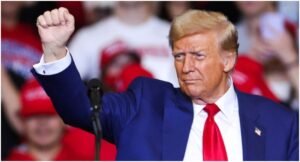
Trump’s administration also sought to weaken the WTO’s dispute settlement system by blocking the appointment of judges to the Appellate Body, effectively paralyzing one of the WTO’s core functions. His administration frequently criticized the WTO for its perceived bias toward developing countries and its failure to curb China’s trade practices, which Trump viewed as detrimental to U.S. economic interests. Given Trump’s scepticism of multilateral institutions, his return to power could pose a significant obstacle to Okonjo-Iweala’s reappointment.
The U.S. is the WTO’s largest member and plays a central role in shaping its direction. If Trump renters the Oval Office, his administration could seek to assert its influence over the WTO’s future, potentially attempting to block Okonjo-Iweala’s second term or support a candidate more aligned with his trade agenda. Okonjo-Iweala’s vision of a reformed, multilateral WTO may not resonate with an administration that views the organization as an impediment to U.S. interests. Moreover, Trump’s populist base, which is generally sceptical of globalist institutions, may push for a leadership change that favours a more protectionist, “America First” approach to global trade.
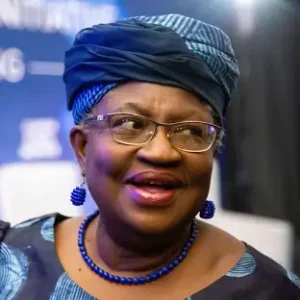
The Special Meeting of the General Council: A Turning Point
As of November 2024, the process of selecting the next Director-General of the WTO has reached a critical moment. A special meeting of the General Council has been scheduled for November 28-29, 2024, to advance the selection process. According to a statement issued by Ambassador Petter Ølberg of Norway, Chair of the General Council, this meeting follows the announcement that no new candidates emerged by the nomination deadline of November 8, 2024. With no competition for the position, Ngozi Okonjo-Iweala is the sole nominee.
This development underscores Okonjo-Iweala’s strong standing within the WTO, particularly considering that the General Council has historically convened such meetings in instances where the incumbent Director-General was the only candidate. The first day of the meeting will provide an opportunity for Okonjo-Iweala to present her vision for the WTO’s future, followed by a question-and-answer session. On the second day, the General Council will consider her reappointment. The lack of other nominees may make her reappointment a formality, but it still depends on securing the necessary support from key WTO members, including the United States.
Okonjo-Iweala’s ability to secure a second term could be influenced by how effectively she can make the case for her continued leadership. If she can demonstrate the progress made during her first term—particularly in reviving the WTO’s negotiating functions, addressing the global vaccine challenge, and advancing trade reforms—she may be able to rally support for her reappointment. However, this is complicated by the shifting political environment, particularly with Trump’s potential return to the White House.
The U.S. Role in Okonjo-Iweala’s Second Term
The U.S. remains a critical player in the WTO, with the power to influence decisions through its voting weight and economic clout. If Trump returns to power, he may once again challenge the WTO’s legitimacy and seek a leadership change. Trump’s populist base views multilateral organizations like the WTO with suspicion, and his administration’s policies were often at odds with Okonjo-Iweala’s vision of a fairer, more inclusive global trading system.
That said, Okonjo-Iweala’s leadership has garnered strong support from other key WTO members, particularly the European Union and emerging economies. The EU has been a consistent ally, advocating for reforms that align with her vision of a more inclusive trading system. African nations, too, view her leadership as a step toward greater representation on the global stage. If Okonjo-Iweala can maintain strong backing from these regions and demonstrate that the WTO under her leadership has made tangible progress, she may be able to mitigate any opposition from the U.S.
Additionally, Okonjo-Iweala’s ability to maintain the support of developing countries—many of which see the WTO’s reforms as crucial to addressing long-standing trade imbalances—will be essential to securing her reappointment. While the U.S. remains a powerful player, the support of a broad coalition of WTO members could provide a counterbalance, making it more difficult for any one nation to block her.
Diplomatic Tactics: Securing a Second Term
To successfully secure a second term, Okonjo-Iweala will need to engage in strategic diplomacy. A key factor will be her ability to demonstrate that the WTO has been effective in addressing the challenges of the modern global economy, including the pandemic’s economic fallout, digital trade, and climate change. Additionally, her diplomatic skills will be tested in building coalitions with key stakeholders, particularly in the U.S., Europe, and the Global South.
If she can present a compelling case that the WTO is evolving under her leadership to address contemporary challenges, she may be able to garner broader support. Maintaining strong relationships with countries like the EU, China, and African nations will be crucial in countering any efforts to derail her reappointment. Okonjo-Iweala’s ability to broker compromises and build consensus will be tested in the coming months as the November meeting approaches.
Challenges and Path Forward
Ngozi Okonjo-Iweala faces a complex set of challenges as she seeks to secure a second term as WTO Director-General. Her first term has been marked by diplomatic successes and significant progress on key issues, but the political dynamics surrounding the WTO are shifting. The potential return of Donald Trump to the U.S. presidency introduces new uncertainties, particularly regarding the U.S. stance on multilateral institutions like the WTO.
However, Okonjo-Iweala’s leadership, diplomatic acumen, and ability to secure broad support from diverse WTO members position her as a strong candidate for reappointment. The special General Council meeting in November 2024 will be a critical moment, and while Okonjo-Iweala is currently the sole nominee, securing her second term will require navigating the delicate balance of global trade politics. If she can continue to advance the WTO’s reform agenda and demonstrate its relevance in addressing global challenges, she may yet overcome the obstacles posed by shifting geopolitical dynamics and secure the support she needs for a second term. The future of the WTO hinges on the ability of its leadership to adapt to the evolving global trade landscape, and Okonjo-Iweala’s leadership will play a crucial role in shaping that future. Suppose she can maintain the momentum of reform, foster stronger relationships with key members, and effectively manage the competing interests of major economies. In that case, she will be well-positioned to continue her work at the organization’s helm.
As the WTO moves toward a decision on her reappointment, the world will be watching closely to see whether it can overcome the challenges posed by rising nationalism and isolationism and whether Okonjo-Iweala’s leadership can continue to steer the organisation toward a more cooperative and inclusive future for global trade.

